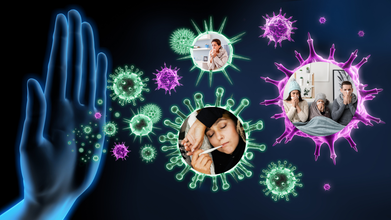- Health Conditions A-Z
- Health & Wellness
- Nutrition
- Fitness
- Health News
- Ayurveda
- Videos
- Medicine A-Z
- Parenting
Facing Sleep Issues? Here Are 7 Ways To Boost Melatonin Production

Credit: Canva
Melatonin is a crucial hormone that promotes sleep by signaling the brain that it is nighttime. Beyond sleep, melatonin also acts as an antioxidant and has anti-inflammatory properties. This crucial hormone is produced by the pineal gland in the brain. While consuming certain fruits and vegetables can stimulate its production, melatonin supplements are also widely used by people struggling with insomnia or jet lag and are available over the counter in many countries.
How Does Melatonin Work?
Melatonin works hand-in-hand with your body’s internal clock, known as your circadian rhythm. This rhythm tells you when to sleep, wake, and even eat. Besides sleep regulation, melatonin also plays a role in managing your body temperature, blood pressure, glucose levels, and some hormones.
At night, as it gets darker, melatonin levels rise, signalling that it’s time to rest. In the morning, exposure to light lowers melatonin levels, helping you feel alert and awake. It interacts with receptors in your brain to slow down nerve activity and reduce dopamine, the hormone that keeps you awake.
7 Habits That Can Boost Melatonin Production
1. Get Morning Sunlight
Exposure to natural light early in the day helps regulate your internal clock and tells your body when to produce melatonin later. According to experts, Natural light in the morning helps regulate your internal clock and signals to your body when it’s time to produce melatonin later.
2. Limit Blue Light at Night
There is empirical evidence that screens from phones, tablets, and TVs suppress melatonin. Adjusting your phone to filter blue light or avoiding screens before bed can help.
3. Eat Melatonin-Rich Foods
Many fruits and vegetables boost melatonin production:
- Tart cherries
Bananas
5. Maintain a Consistent Sleep Schedule
Going to bed and waking up at the same time daily trains your body to produce melatonin more effectively.
6. Avoid Late Meals
Finish eating at least two hours before bed to avoid disrupting your sleep with digestion-related issues. Digestion keeps your body active when it should be winding down and can lead to sleep-disturbing side effects such as heartburn and acid reflux.
7. Manage Stress
Stress raises cortisol, which interferes with melatonin. Meditation, breathwork, and warm baths can promote relaxation. Other healthy bedtime rituals include journaling, reading and listening to a podcast — whatever you need to do to let your muscles relax so that you sleep easily.
Indoor Air In Delhi Is More Toxic Than Outdoor Smog, Pulmonologist Warns

Credits: Canva
Dense, toxic smog covered India’s capital on Monday, driving air pollution to its highest levels in weeks, disrupting travel, and prompting authorities to enforce the strictest containment measures. More than 40 flights were cancelled, with several dozen more delayed. Over 50 trains arriving and departing from New Delhi faced delays of several hours, officials reported. Healthcare experts urged residents to stay indoors as hospitals recorded a surge in patients with breathing problems and irritated eyes. Now, a pulmonologist is warning that indoor air in Delhi might actually be more hazardous than the smog outdoors.
Delhi Pollution: Indoor Air More Toxic Than Outdoor Smog
Indoor air quality in Delhi is reportedly worse than the air outside, according to a lung specialist. Dr. Vivek Nangia, head of pulmonology at Max Healthcare, said indoor spaces can have particulate matter, or PM2.5 levels, nearly two-and-a-half times higher than outdoor readings, even when there are no direct pollution sources indoors.
“Indoor air can be 20 to 30 times more polluted than outdoor air, so it’s important to monitor and improve it,” he explained. Studies have shown that lung-damaging tiny particles inside homes are “substantially higher” than what nearby government monitors report outdoors. This was also confirmed by a study conducted by the Energy Policy Institute at the University of Chicago (EPIC) between 2018 and 2020, which surveyed thousands of Delhi households across different income levels, finding that both rich and poor families are affected equally.
Researchers noted that wealthier households were 13 times more likely to own air purifiers than low-income ones, yet indoor pollution in those homes was only about 10% lower than in disadvantaged settings.
“In Delhi, the bottom line is—whether someone is rich or poor, nobody gets to breathe clean air,” said Dr. Kenneth Lee, the study’s lead author. “It’s a complex, vicious cycle.”
How Does Indoor Air Quality Affect Your Lungs?
Poor indoor air quality (IAQ) can harm the lungs by causing inflammation, weakening the body’s defenses, and triggering or worsening conditions such as asthma and COPD. Pollutants like dust, mold, VOCs, and smoke can lead to coughing, wheezing, infections, and long-term lung damage, even raising the risk of lung cancer over time. Because the lungs are constantly exposed to air, they are extremely sensitive to irritants, which can reduce lung function and capacity—particularly in children, older adults, and those with pre-existing conditions, according to the American Lung Association.
Dr. Nangia noted that patients are now showing a different kind of chest congestion. “These days we’re seeing two kinds of patients—those who never had lung issues before but are now coming in, saying their coughs, sneezing, and chest congestion started once air quality worsened, and those with existing lung problems who are experiencing much worse symptoms,” he said.
How To Protect Yourself From Indoor Toxic Air?
According to the American Lung Association, protecting yourself from indoor air pollution involves controlling sources of pollutants (no smoking, using low-VOC products), improving ventilation (opening windows, using exhaust fans), using HEPA air purifiers, cleaning regularly (dusting and vacuuming), managing humidity to prevent mold, and wearing N95 masks on days with high outdoor pollution to reduce indoor air infiltration.
Is 2025 The Year Of Flu?

Credits: iStock and Canva
Influenza and other respiratory viruses are surging, note the United Nations. In fact Dr Wenqing Zhang, Unit Head for Global Respiratory Threats at the Department of Epidemic and Pandemic Threats Management of the World Health Organization said that this year is marked by "the emergence and rapid expansion of a new AH3N2 virus subclade". This new variant is called J.2.4.1 or subclade K. This was first reported in August in Australia and New Zealand and has since been detected in over 30 countries.
2025 - A Year Of Flu
Earlier in November, the Public Health Ontario's (PHO) data revealed that Ontario and Canada as a whole could be in a "very tough" flu season this year, thanks to the Influenza A or the flu A. The PHO data revealed a 1.8% rise in influenza cases in the last week of October. Now, amid the influenza A outbreak, 3 children have died from the same in Ottawa and Eastern Ontario region.
US is also facing a flu outbreak and as per the Centers for Disease Control and Prevention (CDC) data, an estimated 2.9 million people have gotten sick so far this season. Among them, 1,200 have also died. This is the 'worst' flu season, point out many experts. For US, the country is seeing a post-Thanksgiving spike in influenza, and saw an 8% increase in people testing positive for the flu.
Super flu or the mutated variant of flu, clade K, has swept the world and caused an early spike in cases worldwide. In Australia, it has caused an early summer spike, while in the UK, it has caused a surge in hospitalization. As per the National Health Service (NHS) England, the number of cases of K flu has been increasing since December 7 and December 11. Hospitalization is up 55% in a week, noted NHS.
Is Flu Shot Effective?
The strain driving the current spike has picked up the nickname “super flu” because it is believed to be a mutated form of influenza A (H3N2), known as “subclade K.”
Influenza H3N2 does not circulate as often as some other flu strains. Dr Simon Clarke, associate professor of cellular microbiology at the University of Reading, explains that the letters “H” and “N” refer to two proteins found on the virus surface, haemagglutinin and neuraminidase. “The numbers simply tell us which versions of those proteins are present,” says Dr Clarke. “It’s a way of grouping strains. This year, H3N2 happens to be the one in the lead.”
“H3 subtypes are relatively uncommon,” he adds. “That means fewer people have built up immunity. There is also evidence they spread more easily and mutate faster, which makes them harder for vaccines to keep up with.
“What we are seeing now is the outcome of that: cases rising sharply earlier than usual, with numbers likely to climb further as winter goes on.”
Recent figures suggest the flu vaccine cuts the risk of hospital admission by roughly 30 to 40 per cent in older adults. That protection rate is lower than for some other vaccines, but it is in line with flu vaccine performance in past years. For that reason, advice has not changed. Vaccination remains the single most effective step people can take to protect themselves and to ease pressure on the NHS.
Super Flu or The K Strain
Known as the superfly, this is H3N2 'subclade K'. It is a type of seasonal influenza A virus and people have not encountered much of it in the recent years. This is why there is less immunity against it. However, the National Health Service (NHS), UK, has already sent out a 'flu jab SOS' to vulnerable people.
NHS has confirmed that the super flu is circulating in England this year, and due to less immunity, it is making it easier to spread across people. The UK Health Security Agency (UKHSA) has urged people to get a flu jab. As per the early data, this year's vaccine has offered good protection despite the new strain.
Daniel Elkeles, chief executive of NHS Providers, said that the major concern is that H3N2 is associated with a more severe illness and superflu could be "a very nasty strain of flu". He said that UK could be experiencing a "tidal wave" of illness.
What Is Influenza A?
As per the National Institutes of Health, US, influenza viruses that contains single-stranded RNA that are classified into three types: A, B, and C. Type A and B cause annual epidemics and even pandemics, while type C is a less common disease.
As per the Centers for Disease Control and Prevention (CDC), Influenza A viruses are descendants of the 2009 H1N1 pandemic virus that emerged in the spring of 2009 and caused a flu pandemic. These viruses, scientifically called the "A(H1N1)pdm09 virus," and more generally called "2009 H1N1," have continued to circulate seasonally since 2009 and have undergone genetic and antigenic changes.
Influenza A(H3N2) viruses also change genetically and antigenically. Influenza A(H3N2) viruses have formed many separate, genetically different clades in recent years that continue to co-circulate.
Not Boarded Any Flight And Still Monday Feels Like A Jetlag? You Are Not Alone

Credits: iStock
It is Monday morning and your alarm rings at 6am. You hit snooze at least twice and feel why weekends are so short. A little bit rewind to two days back, Friday night after work, you did some binge watching and slept till noon on Saturday and again woke up late on Sunday. By evening, you finally felt like a human and again in a few hours, Monday came in. Your body, still confused, groggy, and also a slightly resentful. You feel like you are jetlagged even though you have not even boarded a flight.
This is not laziness or poor discipline, this is social jetlag. Many Indians are living through it. Many of us have two sleep times. One for weekdays and one for the weekends and if you are on a roaster, then your sleeping time adjusts according to your off-days. But the truth is you are not sleeping enough at least for the five days you work and make up for it on your off days. This is what scientists call a social jet lag and it is raising long-term health risks.
What Exactly Is Social Jetlag?
A 2012 study by Till Roenneberg explains that the term 'social jetlag' refers to the mismatch between your biological clock and your social clock. Your biological clock is governed by circadian rhythms, internal processes that decide when you feel sleepy or alert. Your social clock is set by work timings, school schedules, household responsibilities, and social expectations.
Most people sleep earlier and wake up earlier on weekdays because they have to. On weekends, they sleep later and wake up later to recover lost sleep. Researchers describe this as similar to flying across time zones and back every week, except your environment does not change. The sun rises at the same time, but your sleep does not.
Studies suggest that nearly 80 percent of people experience some degree of irregular sleep by shifting sleep times between weekdays and weekends. This pattern has become common due to artificial lighting, late-night screen exposure, and work schedules that are misaligned with natural circadian preferences.
Modern Life Makes It Worse, Here's Why
Artificial light has quietly changed how humans interact with night and day. Evening exposure to bright lights from phones, televisions, and laptops delays the body’s internal clock. This makes it harder to fall asleep early, even when you need to wake up early the next morning.
Over time, this weakens the natural cues that tell the body when it is time to rest and when it is time to be active. Researchers note that this effect creates more late chronotypes, people who naturally feel alert later at night. Unfortunately, most school and office schedules still reward early risers.
The result is a repeated pattern of sleep restriction during weekdays and catch-up sleep on weekends. Unlike travel jetlag, which resolves once the body adjusts to a new light-dark cycle, social jetlag does not correct itself. The solar cycle stays the same, while sleep timing keeps shifting back and forth.
Light is the primary driver of circadian rhythm. In the morning, exposure to sunlight tells the brain to stop producing melatonin, the hormone that makes us sleepy so we feel alert and ready for the day. By evening, melatonin production rises, pushing us toward rest. Night shifts turn this cycle upside down. Instead of winding down, the body is forced to stay active at the very hours it is wired for repair and recovery.
This constant mismatch creates what scientists call 'social jetlag. Your body never gets used to it, because it runs on an internal clock and this is why despite working the same shifts for years, you feel confused.
Indians Are Sleeping Way Less
Data from India paints a worrying picture. A nationwide LocalCircles survey found that 55 percent of Indians get less than six hours of uninterrupted sleep each night. This is an increase from 50 percent the year before, showing that sleep deprivation is getting worse, not better.
Among the reasons cited were late bedtimes combined with early household responsibilities, frequent nighttime awakenings, environmental noise, mosquitoes, and medical conditions like sleep apnea. Even those who spend enough time in bed often experience fragmented sleep.
Wearable sleep data tells a similar story. Fitbit’s global sleep analysis placed Indians as the second most sleep-deprived population after Japan. On average, Indians sleep just over seven hours a night, nearly 50 minutes less than users in the UK and significantly less than Americans. Indians also get the lowest amount of REM sleep globally, a stage critical for memory, emotional regulation, and mental health.
Social jetlag is especially pronounced among adolescents and young adults. Research consistently shows that teenagers naturally shift toward later sleep and wake times due to developmental changes. However, early school start times force them to wake up before their biological clocks are ready.
Late chronotypes accumulate sleep debt during the week and try to repay it on weekends. This pattern has been linked to higher body mass index, metabolic issues, daytime sleepiness, and poorer academic performance. Living against the clock, researchers suggest, may be quietly contributing to the rising burden of obesity and mental health concerns.
In India, academic pressure, coaching classes, screen use, and reduced parental control over sleep schedules only amplify this misalignment.
Social Jet Lag Is Not Just About Feeling Tired, It Has Grave Health Impact
Hormones take the first hit. Our body gets confused on how to regulate melatonin, which is a sleep hormone and cortisol, which is the wake up hormone. It also reduces appetite suppressing hormone leptin, while turning up the hunger hormone ghrelin. This is why you feel the midnight munchies. Chronic sleep deprivation could also lead to prediabetics, as increasing sugar cravings make it difficult for people to prioritize healthy eating.
Studies have associated it with increased risks of obesity, metabolic syndrome, and mental health disorders. It has also been linked to lower productivity, reduced concentration, and mood disturbances.
Addressing social jetlag requires more than sleep tips. Experts suggest later school start times, flexible work hours, reduced evening light exposure, and greater awareness of circadian health. Small changes, like maintaining similar sleep timings on weekdays and weekends, can help, but they cannot fully solve a systemic problem.
Until then, millions of Indians will continue waking up exhausted, wondering why rest feels so elusive.
© 2024 Bennett, Coleman & Company Limited

